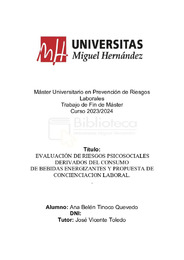Resumen :
El presente trabajo de final de máster tiene como objetivo analizar los riesgos psicosociales asociados al consumo de bebidas energizantes en el entorno laboral y proponer estrategias de concienciación para promover hábitos saludables y prevenir los efectos negativos en la salud y el bienestar de los trabajadores. Se realizó una exhaustiva revisión bibliográfica utilizando bases de datos como “Pubmed, Scielo, Biblioteca Cochrane y Google Académico”, empleando descriptores en español e inglés relacionados con bebidas energizantes, impactos en la salud, educación en salud y riesgos laborales. Las fuentes incluyeron documentos originales, artículos científicos, normativas recientes, tesis doctorales y documentos de organismos oficiales. Se priorizó la información de organismos oficiales y artículos actuales, con una antigüedad máxima de 20 años, y se incluyeron normativas recientes y aplicables al tema de estudio.
Los datos obtenidos muestran que el 50% de los encuestados consume 1-2 bebidas energizantes al día, un nivel moderado de consumo. Sin embargo, un 14% consume 3- 4 bebidas diarias y un 10% más de 4 bebidas, un patrón preocupante con posibles consecuencias adversas para la salud. Un 26% de los encuestados no consume bebidas energizantes, lo que es positivo.
La educación continua puede desempeñar un papel crucial en la prevención de
problemas de salud relacionados con el consumo de bebidas energizantes. Al proporcionar a los trabajadores información detallada sobre los efectos negativos y promover alternativas saludables, las empresas pueden reducir el riesgo de enfermedades graves y mejorar el bienestar general de sus empleados. Las estrategias
de formación deben incluir talleres y sesiones informativas que discutan los efectos negativos de las bebidas energizantes y ofrezcan alternativas saludables para manejar la fatiga y el estrés. Las empresas deben incorporar estos temas en sus planes de prevención y bienestar, asegurando que todos los empleados reciban la información necesaria.
The aim of this master's thesis is to analyze the psychosocial risks associated with the consumption of energy drinks in the workplace and to propose awareness-raising strategies to promote healthy habits and prevent the negative effects on the health and well-being of workers. An exhaustive literature review was carried out using databases such as Pubmed, Scielo, Cochrane Library and Google Scholar, using Spanish and English descriptors related to energy drinks, health impacts, health education and occupational hazards. The sources
included original documents, scientific articles, recent regulations, doctoral theses and documents from official organizations. Priority was given to information from official bodies and current articles, with a maximum age of 20 years, and recent regulations applicable to the topic of study were included.
The data obtained show that 50% of the respondents consume 1-2 energy drinks per day, a moderate level of consumption. However, 14% consume 3-4 drinks per day and 10% consume more than 4 drinks per day, a worrying pattern with possible adverse health consequences. 26% of respondents do not consume energy drinks, which is positive. Continuing education can play a crucial role in preventing health problems related to the consumption of energy drinks. By providing workers with detailed information about the negative effects and promoting healthy alternatives, companies can reduce the risk of serious illnesses and improve the overall wellbeing of their employees. Training strategies should include workshops and information sessions that discuss the negative effects of energy drinks and offer healthy alternatives to manage fatigue and stress. Companies should incorporate these issues into their prevention and wellness plans, ensuring that all employees receive the information they need.
|
 La licencia se describe como: Atribución-NonComercial-NoDerivada 4.0 Internacional.
La licencia se describe como: Atribución-NonComercial-NoDerivada 4.0 Internacional.
.png)
